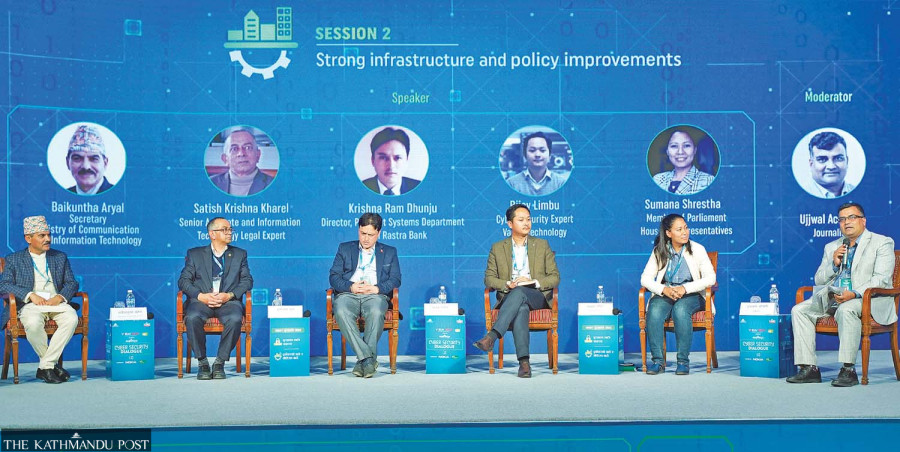Science & Technology
Building Nepal’s resilience to tackle cyber threats
Government advised to take cyber attacks seriously, come up with policies to make internet use safer and more productive.
Post Report
With a rapid growth of internet connectivity and speedy advancement of information technology, criminals around the world are increasingly using digital tools and platforms to inflict harm on others. In Nepal, there has been an unprecedented rise in complaints of cyberspace misuse and cyber crimes.
Last month about 1,500 government websites were shut down, which also affected flights from the Tribhuvan International Airport, raising questions over the cybersecurity infrastructure in Nepal. In the past seven months, the cyber bureau registered over 600 cases of ‘revenge porn.’
The Nepal Police bureau registered 4,646 cases related to cyber crimes in the last fiscal year. These included incidents of hate speech on social media, defamation, banking frauds, and identity theft, among others. Of the registered cases, 1,011 were related to revenge porn.
Even though the number of internet users is rising in Nepal, literacy in the internet is low. There has not been a significant discourse on Nepali internet users’ growing vulnerability to cyber crimes. The Kantipur Media Group on Thursday organised a ‘cyber security dialogue’ on the theme ‘the question of cyber security.’
Speaking at the event held in Kathmandu on Thursday, Rekha Sharma, minister for communication and information technology, said organising such an event would inform the masses on cyber issues.
The keynote speaker also stressed the need for investments in ensuring cyber security in the country.
“It’s the government that should have taken the initiative that the KMG did. We are discussing with the stakeholders to organise such an event,” said Sharma, adding that the government was drafting the law on cyber security.
Sudheer Sharma, editor-in-chief of Kantipur daily, stressed that in its three-decade-long journey, KMG had facilitated discourse on topics ranging from politics and education to federalism but the dialogue on cyber security was new.
“This is the first time we are discussing cyber security, and it's an important topic because Nepali society is already facing cyber threats and attacks, and the internet greatly influences us,” Sharma said.
The first session, titled ‘greater use , minimal literacy’, brought together Purushottam Khanal, chairman of Nepal Telecommunication Authority; Senior Superintendent of Police and Cyber Bureau Chief Navind Aryal; Chief Operating Officer of Prabhu Bank Rashmi Pant; Managing Director Sanjay Golcha of Neoteric Nepal; and Cyber Security expert Vivek Rana. The discussion was moderated by Sajana Baral, a journalist with Kantipur daily.
According to Aryal, the bureau receives about 70–80 complaints related to cyber crimes on average daily. Many panellists agreed that in the absence of specific cyber law, it was difficult to handle the complaints.
“The only way we can handle these problems is with trained and qualified manpower, adequate resources, and a staff retention policy,” said Aryal. The most vulnerable group in cyberspace are women and children, he added. “Awareness of, and literacy in, internet use is the key to cyber security.”
Pant of Prabhu Bank said banks are sensitive to cyber security. Arguing that most banking frauds were due to people’s ignorance, she stressed public awareness.
Other panellists suggested that the government should incorporate cyber security and internet use in the school curricula.
Rana, the cyber security expert, wanted parliamentarians to discuss the issue. “How many times have our elected representatives talked about cyber security in Parliament?” he said.
Panellists said there should be more interactions among friends and family about cyber security.
In the second session, Baikuntha Aryal, secretary at the Ministry of Communication and Information Technology; Satish Krishna Kharel, senior advocate and information technology legal expert; Krishna Ram Dhunju, director of the Payment Systems of Nepal Rastra Bank; Bijay Limbu, cyber security expert at Vairav Technology, and Member of Parliament Sumana Shrestha presented their views in a discussion moderated by journalist Ujwal Acharya.
The panellists also discussed ‘strong infrastructure and policy improvements’ as a means to solve emerging problems.
Senior advocate Kharel said the government was not serious about cyber security. “Nepal not only lacks cyber law, there is no investigation into cyber crimes for want of necessary infrastructure and skilled manpower,” he said.
MP Shrestha shared how unprepared the government was in terms of cyber security as no lawmaker had been trained on technology issues. She also stressed the need for more discourse on cyber security at the grassroots level.
Cybersecurity expert Bijay Limbu said the cyber bureau of Nepal Police alone was unable to address emerging problems. He also pointed to the lack of a mechanism for cyber diplomacy to deal with other countries.
Limbu appreciated the banking sector for its attention to cyber security. “They have at least invested in cyber security, but banks are more vulnerable to cyber attacks.”
In his closing remarks, chief executive officer of Kantipur Publications Mahesh Swar said Nepal has a lot of potential in the IT field but the government must come up with appropriate policies and a mechanism to deal with threats.
The cyber field is fraught with security challenges but information technology provides a great scope of opportunities, said Swar, presenting the case of Nepali youths earning more from foreign contracts than working here. He cited Vairav Technology, which works as a threat monitoring analyst for bloomberg.com, and many reputed international companies.




 19.12°C Kathmandu
19.12°C Kathmandu









